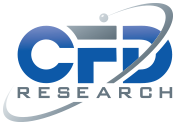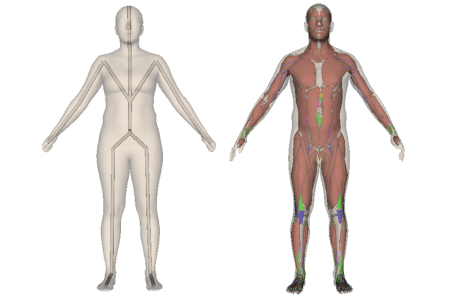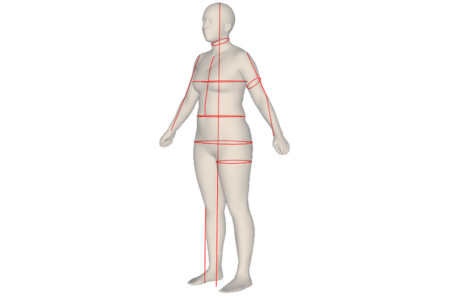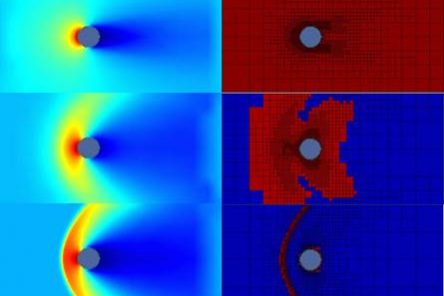The Loci framework was developed by Prof. Ed Luke of Mississippi State University (MSU). It is an auto-parallelizing framework which simplified development of complex, large-scale simulation software that can execute on supercomputers efficiently. The framework provides significant capabilities which have been further extended by CFD Research in collaboration with Prof. Ed Luke over the last two decades.
Loci/CHEM – Extension, Consulting and Customized Development
CFD Research has more than 40 years of combined experience in developing customized capabilities for the Loci/CHEM flow solver. The solver has been applied to large-scale CFD simulations of reacting flows, including high-speed and real-fluids-based rocket engine and gas-turbine simulations. The solver capabilities have been extended to allow production-level coupled fluid-structure, continuum-rarefied, and gas-granular flows of interest to NASA, DoD, DoE and Aerospace and Defense industry partners.
Loci/GGFS – Gas-Granular Flow Solver
CFD Research has developed a Eulerian-Eulerian gas-granular flow solver for modeling granular material efficiently and accurately. The solver has been applied to large scale simulations of plume-soil interactions, upwards of 100M cells, and 8-10K processors. The results include cratering characteristics, debris and regolith characteristics post impact. The solver can also be applied in process modeling industry and fluidized bed modeling. Constitutive relationships for polydisperse spherical particle systems, and for specific applications DEM-informed non-spherical particle systems can be incorporated into the models.
Loci/Boltzmann – Rarefied Gas-Dynamics Flow Solver
CFD Research has developed a Eulerian rarefied gas-dynamics flow solver which can provide more than an order-of-magnitude superior performance compared to the Monte Carlo based solvers. The solver can also be coupled to Loci/CHEM to allow combined continuum-rarefied flow simulations accurately. Full-collision integrals, as well as BGK based approaches for 3D and axisymmetric configurations is available. Monoatomic and diatomics species mixtures can be simulated. The tool can be applied for various in-space applications, including space thrusters, plume evolution, and other aspects.
Loci/THRUST and Acoustics Solver
CFD Research has developed capability to allow high-order acoustics propagation in conjunction with CFD Solver. The tools can be used for acoustic analysis and for combustion stability analysis.
Loci/VOF – Gas-Liquid Flow Solver Module
A fully unstructured volume-of-fluid (VOF) solver module that links with Loci/CHEM and Loci/STREAM is available. The module has been applied for slosh-dynamics modeling, surface tension driven flows in micro-gravity, ignition-over pressure mitigation and other applications. It has also been used for injector design and analysis. The module allows capability to deduce vof structures, and allows coupling with Lagrangian particle transport framework for smaller (under-resolved) liquid structures. Simulations with ~100M cells have been conducted on NASA and DoD supercomputers.
Loci/RTE – Generalized Radiative Transfer Equation Solver for Combustion Systems
A generalized radiative transfer equation solver has been developed for analyzing combustion systems. The solvers and radiative property models allow close to line-by-line accuracy for radiation transport modeling in combustion systems. Multiple RTE solvers including spherical harmonics, finite-volume discrete ordinates, and photon Monte Carlo methods are available. High-accuracy radiative property databases for key combustion gases including CO2, CO, H2O, and C2H4 based on the full-spectrum k-distribution approach are available, as well as line-by-line random-number relationships from 0.1 bar to 80 bar are available. The solver can also couple with any existing CFD solver with a well-defined API. The RTE Solver also provides a dual-mesh capability, to allow a coarser radiation grid compared to the flow grid.





